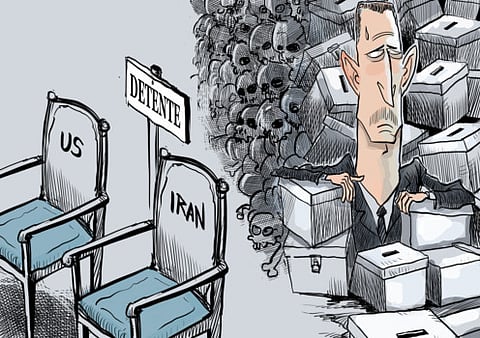Elections cannot mask Al Assad
Al Assad may believe he has the measure of Obama who will tolerate anything

President Bashar Al Assad of Syria has re-emerged in public of late, confident that the tide of the vicious civil war that started as a civic uprising against his dictatorship has turned in his favour. Announcing he is standing for a third seven-year term, he pleaded with Syrians to restrain any “demonstration of joy”, as his courtiers plastered Damascus with posters calling him “King of Kings”. He has some reason to swagger.
There is no doubt he will be re-elected on June 3 — leader of a rump Syria on its knees in the fourth year of fighting, with more than 150,000 dead and almost 10 million Syrians uprooted from their shattered homes. Things have been going Al Assad’s bloody way.
After last summer’s sarin nerve gas attacks on rebel enclaves east of Damascus, as if by political alchemy, weakness became strength, as US President Barack Obama cancelled planned US missile attacks on regime assets, in exchange for a Russian-brokered deal to hand over Syria’s chemical weapons arsenal for destruction. This, in effect, gave the Al Assad regime a medium-term contract, rehabilitating it from international pariah into partner, as the chronically disunited rebels were all but frogmarched by western powers into fruitless negotiations in Geneva. The regime’s allies — Iran’s Revolutionary Guards, Lebanese Hezbollah paramilitaries and Iranian-trained Shiite militia from Iraq — launched new offensives, such as the now-concluded battle of Qalamoun to clear rebels from supply routes near Syria’s border with Lebanon.
Syria’s air force, meanwhile, continues to pound cities from Homs to Aleppo, as the regime starves rebel areas inside its perimeter and murders thousands detained in its dungeons. The Al Assads have read US and international hesitation as a green light to keep slaughtering their people — just so long as they no longer gas them.
Within his area of control, therefore, Al Assad can select his own electorate. The millions of refugees will be absent. Candidates have to demonstrate 10 years of continuous residence in Syria and gather 35 signatures from the rubber-stamp parliament; that rules out any credible rebel or dissident. The six other candidates included in this tableau vivant of tyranny are the “attendant lord(s)” T.S. Eliot evokes in “Prufrock”: There “to swell a progress, start a scene or two”.
Yet, this faux-regal figure, who inherited Syria’s notional republic from his father, Hafez Al Assad, who ruled it for 30 years, may be more vulnerable than he looks.
The Syrian battlefield is both patchwork and see-saw. Rebels last month punched into the Al Assads’ north-western hinterland of Latakia, capturing the strategic town of Kasab and reaching the sea. This rebel bridgehead is psychologically as well as strategically dangerous to the Al Assads — and hard to eradicate. Air power is little use since Kasab is close to the frontier with Turkey, which shot down a Syrian jet near the border crossing on March 23. The hilly terrain is difficult and the regime has serious manpower shortages.
At the same time, western powers are starting to suspect Damascus does not intend to hand over all its chemical arms and amid credible reports it has been using chlorine gas (not part of the handover anyway), there is speculation the Al Assad regime may be preparing new gas attacks in the northwest. One well-connected Latakia resident says that three villages around Kasab — inhabited mostly by members of the Al Assads’ minority Alawite sect — have just been evacuated. This proves nothing, but it is shaking up an area so far largely spared the war.
— Financial Times
Sign up for the Daily Briefing
Get the latest news and updates straight to your inbox


